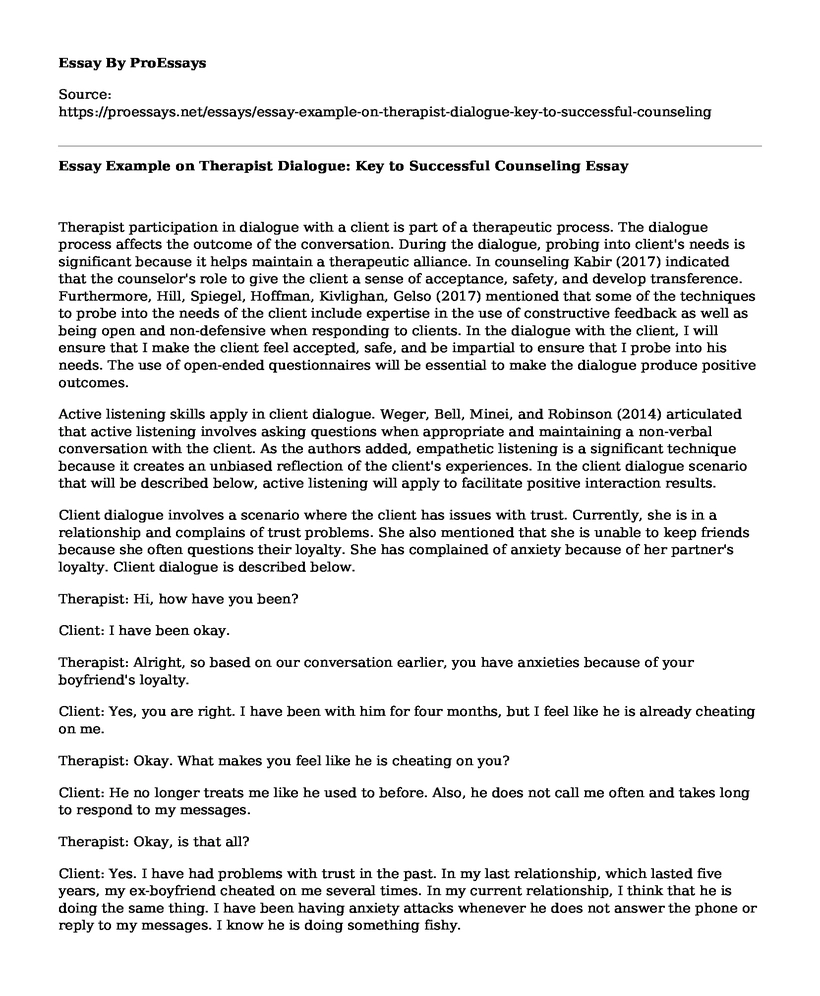Therapist participation in dialogue with a client is part of a therapeutic process. The dialogue process affects the outcome of the conversation. During the dialogue, probing into client's needs is significant because it helps maintain a therapeutic alliance. In counseling Kabir (2017) indicated that the counselor's role to give the client a sense of acceptance, safety, and develop transference. Furthermore, Hill, Spiegel, Hoffman, Kivlighan, Gelso (2017) mentioned that some of the techniques to probe into the needs of the client include expertise in the use of constructive feedback as well as being open and non-defensive when responding to clients. In the dialogue with the client, I will ensure that I make the client feel accepted, safe, and be impartial to ensure that I probe into his needs. The use of open-ended questionnaires will be essential to make the dialogue produce positive outcomes.
Active listening skills apply in client dialogue. Weger, Bell, Minei, and Robinson (2014) articulated that active listening involves asking questions when appropriate and maintaining a non-verbal conversation with the client. As the authors added, empathetic listening is a significant technique because it creates an unbiased reflection of the client's experiences. In the client dialogue scenario that will be described below, active listening will apply to facilitate positive interaction results.
Client dialogue involves a scenario where the client has issues with trust. Currently, she is in a relationship and complains of trust problems. She also mentioned that she is unable to keep friends because she often questions their loyalty. She has complained of anxiety because of her partner's loyalty. Client dialogue is described below.
Therapist: Hi, how have you been?
Client: I have been okay.
Therapist: Alright, so based on our conversation earlier, you have anxieties because of your boyfriend's loyalty.
Client: Yes, you are right. I have been with him for four months, but I feel like he is already cheating on me.
Therapist: Okay. What makes you feel like he is cheating on you?
Client: He no longer treats me like he used to before. Also, he does not call me often and takes long to respond to my messages.
Therapist: Okay, is that all?
Client: Yes. I have had problems with trust in the past. In my last relationship, which lasted five years, my ex-boyfriend cheated on me several times. In my current relationship, I think that he is doing the same thing. I have been having anxiety attacks whenever he does not answer the phone or reply to my messages. I know he is doing something fishy.
Therapist: Okay. I understand your concerns. Let me ask you something. Does he work?
Client: Yes, he does. He works a six-hour shift at a grocery store and goes to school.
Therapist: Okay. Does he always call back to know how you are doing after the day ends?
Client: Yes, he does, but I feel like he is doing something else. I think I am letting my past relationship is affecting me.
Therapist: I understand your concerns. Do you work or go to school?
Client: I am waiting to enroll in college for my masters' program. I do not work for now.
Therapist: Alright. Try to understand that your boyfriend might be busy. Let us do this. Whenever he is at work or school, you need to keep yourself preoccupied to relieve the thoughts of him cheating. Also, in our next session, I was hoping you could get a piece of paper, divide it into two sections, and one side, write what your like about him, and on the other, write what you dislike. Can you do that?
Client: Yes, I can.
Therapist: Alright. See you next week.
References
Hill, C. E., Spiegel, S. B., Hoffman, M. A., Kivlighan, D. M., & Gelso, C. J. (2017).
Therapist expertise in psychotherapy revisited. The Counselling Psychologist, pp. 1-47. doi: 10.1177/0011000016641192
Kabir, S.M.S. (2017). Counselling approaches. n book: Essentials of Counseling (pp.117
204) Edition: First Chapter: 6 Publisher: Abosar Prokashana Sangstha, Banglabazar, Dhaka-1100
Weger, H., Bell, G. C., Minei, E. M., & Robinson, M. C. (2014). The relative effectiveness of
active listening in initial interactions. International Journal of Listening, 28(1), pp. 13-31. doi: 10.1080/10904018.2013.813234
Cite this page
Essay Example on Therapist Dialogue: Key to Successful Counseling. (2023, Jul 02). Retrieved from https://proessays.net/essays/essay-example-on-therapist-dialogue-key-to-successful-counseling
If you are the original author of this essay and no longer wish to have it published on the ProEssays website, please click below to request its removal:
- Success Path Exploration in Poetry - Literary Essay Example
- Research Paper on Attention Deficit/Hyperactivity Disorder (ADHD)
- Pharmacological Treatment of Mental Illness Essay Example
- Literature Review on Growth vs. Fixed Mindset
- Essay Sample on Little Hans' Phobia: Freud's Oedipus Complex Study
- Essay Sample on Human Memory Distortions: Challenges in Daily Activities
- Paper Sample on 4 Studies Show How Exercise Can Help Alleviate Depression







